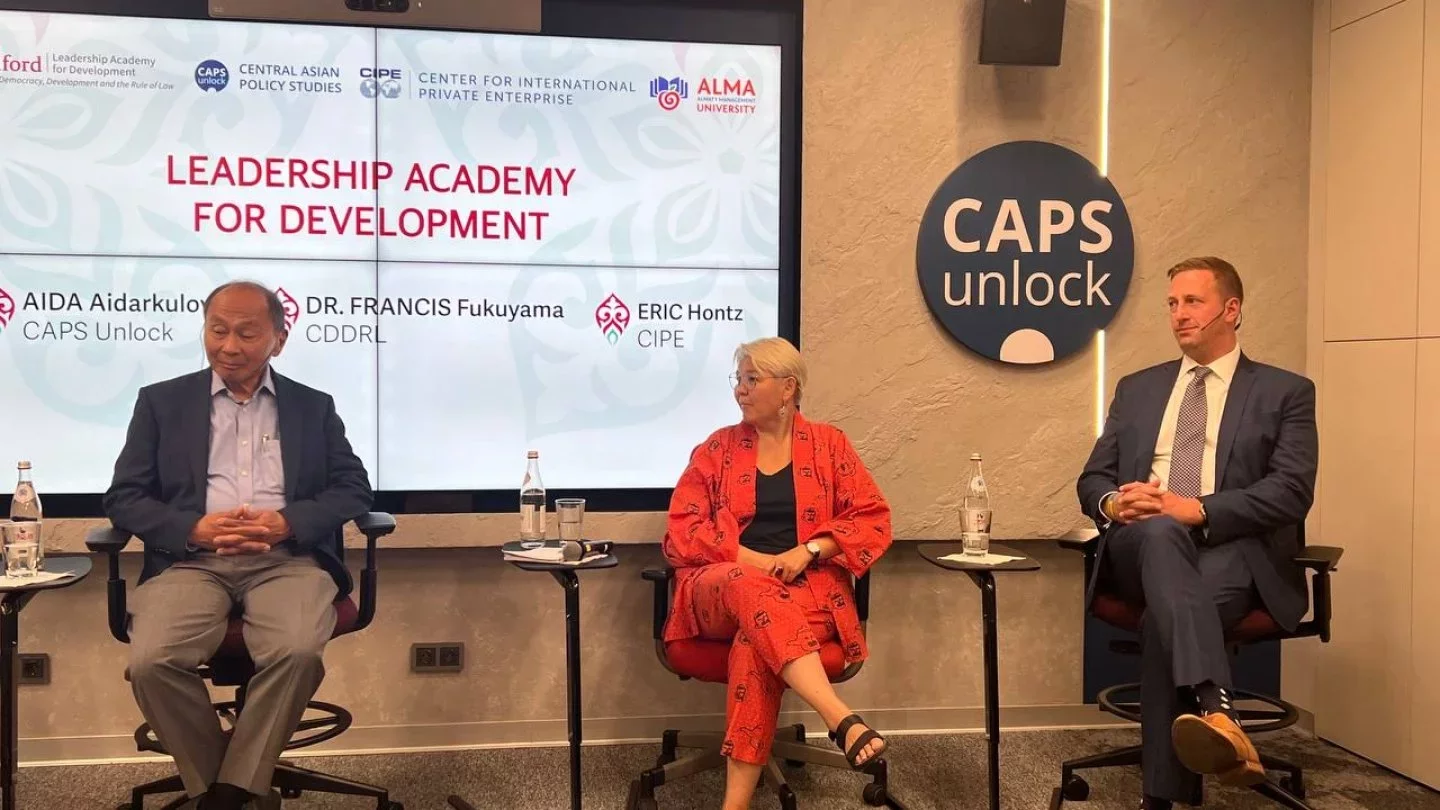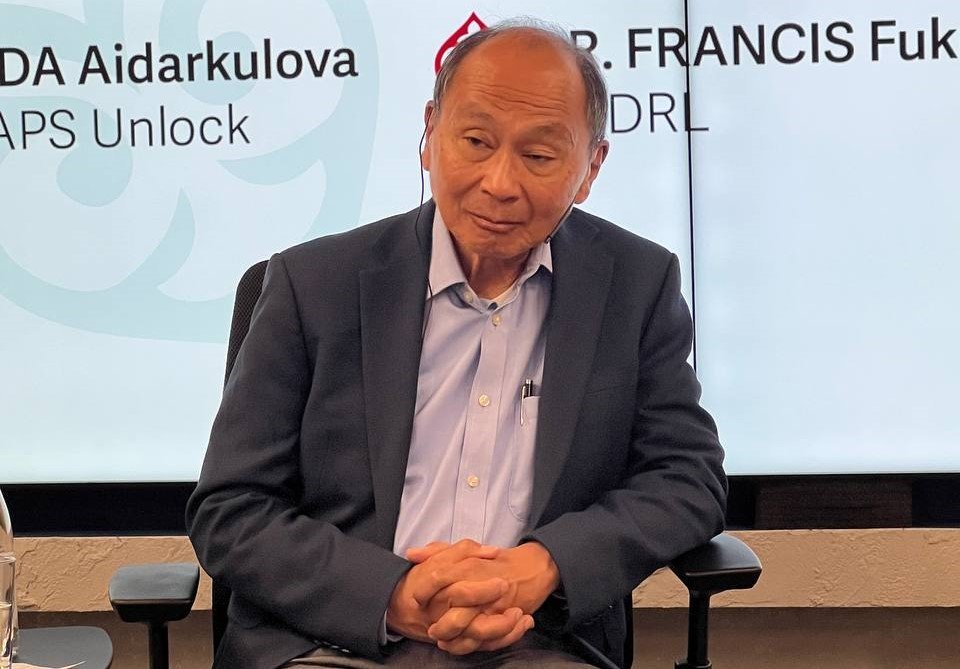Francis Fukuyama in Almaty: Global Changes and Special Course for Central Asian Leaders
 Orda.kz
Orda.kz
The world-renowned international relations specialist and author of the world bestseller "The End of History and the Last Man", Francis Fukuyama, will deliver a course of lectures in Almaty for representatives of politics, business and public organizations. Fukuyama also spoke about his vision of the latest world events along with Central Asia’s place in the world order, Orda.kz reports.
Professor of Political Science and Director of the Master's Program in International Politics at Stanford University is in Almaty for the first time. He and other experts from the US have been invited to conduct the Leadership Academy for Development (LAD) program.
Its aim is to train leaders who will promote economic growth, sound public policy, and market reforms, as well as non-standard decision-making in Central Asian countries. The program is supported by the analytical center CAPS Unlock (Central Asian Policy Studies).
35 out of more than 300 applicants have been selected. According to Eric Hontz, an expert on economic reforms and policy, director of the Center for Accountable Investments at the Center for International Private Enterprise (CIPE), several criteria were used in the selection of candidates.
We relied on factors such as gender, profession, the sector in which one works, and from which country the candidate is. These are smart and intelligent people from Central Asian countries who represent the public, private sector and civil society
Representatives of five states of the region, including two participants from Turkmenistan, will take part in the course. The organizers hope that the LAD participants will continue to actively interact with each other.
Global Geopolitical Shifts
Those leading the course, including Professor Fukuyama, shared their views on global changes in recent political events and Central Asia's development.
"We, as a world, are going through very serious changes, and if we are talking about Kazakhstan, it is sandwiched between major powers such as China and Russia, which are also going through big changes. There are shifts both in the European Union and in the United States, internal reflection is also taking place, it seems to me that the world will seriously change. Such powerful changes can coincidentally happen in this region. This is why the region is interesting to me and it seems that Americans need to study and learn more about Central Asia” Francis Fukuyama said.
 Political scientist, philosopher and writer Francis Fukuyama, photo Orda.kz
Political scientist, philosopher and writer Francis Fukuyama, photo Orda.kzAnswering the question of whether the conflict in Ukraine is regional, Francis Fukuyama said he considers that it is global and Vladimir Putin's view on the USSR’s dissolution to be the reason.
Mr. Putin said from the very beginning that he was dissatisfied with the way the Soviet Union broke up, how the countries that gained independence behaved. He stressed that he was not satisfied with the world order that had developed in 1991. He doesn't like the way Ukraine and others behaved, so this is not a regional conflict, in my opinion.
The political expert is currently watching with interest how the countries of Central Asia are distancing themselves from Russia. He believes that none of them took an openly pro-Russian position after the start of the full-scale invasion of Ukraine despite their heavy dependance on the former center.
Kazakhstan’s Foreign Policy
The author of monographs and Stanford professor also answered the question regarding what he would do as an adviser to the President of Kazakhstan on international relations, especially regarding building relations with our largest neighbors – Russia and China, which have entered into a political confrontation with the West.
Kazakhstan has done everything to maximize freedom to act, taking into account the current state of affairs. And it would be best not to become dependent on countries that influence Kazakhstan – this is not only Russia, China, but the European Union, as well as Japan, Türkiye, South Korea, there is also the United States, which also has its own interests. So far, I see a diplomatic course for maximum independence, taking into account the geographical location of Kazakhstan. If I worked in the Kazakh Foreign Ministry, then I would follow such a policy – maximum freedom to act, taking into account the geopolitical situation.
As an example of a balanced foreign policy, Fukuyama cited Mongolia after the Soviet Union’s collapse. Mongolia, while being in a similar geographical position, i.e. between two major world powers, has kept its own democratic institutions and foreign policy, while maintaining good-neighborly relations with Russia and China.
Central Asia’s Development and Possible Global Conflict
Speaking about Central Asia, Fukuyama believes that there is too much state presence in various spheres, including in business and citizens’ lives. When asked which region of the world could become a new point of geopolitical tension, Fukuyama replied – East Asia.
By invading Ukraine, Russia has set a poor example to other countries that it is possible to invade the territories of independent states in this way. China's rhetoric about Taiwan has somewhat intensified. We all began to think about how threats could materialize and how we would behave in this situation. If such a conflict breaks out, it will be a catastrophe for the world. And the United States should do everything possible to prevent it."
According to the political scientist, now there is a global conflict between different systems. We are also seeing the weakening of States that have not turned out to be as strong as they had once positioned themselves. This has become obvious to many due to the war in Ukraine. Something similar is happening with China, which in previous years showed very rapid economic growth. However, after the coronavirus pandemic, its economy has demonstrated sluggish growth.
Many economists say that there are serious hidden pitfalls in China that affect economic growth. And the results will show which economic system the world needs, (which - Ed.) is suitable or not suitable for development.
Francis Fukuyama presented his new book "Liberalism and Its Discontents" in Almaty this past Tuesday. It was published in English in 2022. It is currently available in Russian and Kazakh in Kazakhstan.
Original Author: Maxim Skopin
DISCLAIMER: This is a translated piece. The text has been modified, the content is the same. Please refer to the original piece in Russian for accuracy.
Latest news
- Kazatomprom Signs Memorandum on Uranium Supply with Slovak Power Company
- Energy Ministry Proposes Canceling CT-KZ Certificate for Local Producers
- Kazakhstan Wins Four Medals at International Chemistry Olympiad
- Trump Announces New Patriot Missile Deliveries to Ukraine After Talks with Putin Stall
- Former Special Prosecutor Olesya Keksil Named as Suspect in Torture Case
- Trial Begins for Perizat Kairat Accused of Embezzling 3.5 Billion Tenge
- Week In Review: Tensions, Diplomacy, and Accusations Roil the South Caucasus
- KNB And Antikor Merger: Orda.kz Examines the Evolution of Kazakhstan’s Security Service
- Toqayev Briefed on Kashagan Gas Plant and Pipeline Expansion Projects
- Storms and Scorching Heat Forecast Across Kazakhstan From July 15
- Kazakhstan Proposes Lower Language Threshold for Citizenship Exam, Raises Constitutional Knowledge Requirement
- Digital Nomad Residency: Authorities Respond to Technical Complaints
- Toqayev Sends Bastille Day Greetings, Emphasizes Strategic Ties With France
- KNB Chief Sagimbayev: From Terrorism to Cybercrime, Kazakhstan Faces Complex and Evolving Security Threats
- Kazakhstan Establishes Presidential Reserve Fund Holding Up to 3% of Budget Revenues
- Scammers Posing as Security Agents Trick Architect Into Selling Property
- Ulytau Officials Respond to Fine: Blogger Was Penalized Over Unfounded Corruption Claims
- Kazakhstan Lifts Gallium Export Duty
- Chinese Firm Proposes to Fund New Port and Logistics Hub in Mangystau Region
- ForteBank Stock Soars on Home Credit Deal, Then Plunges 30% in a Day

